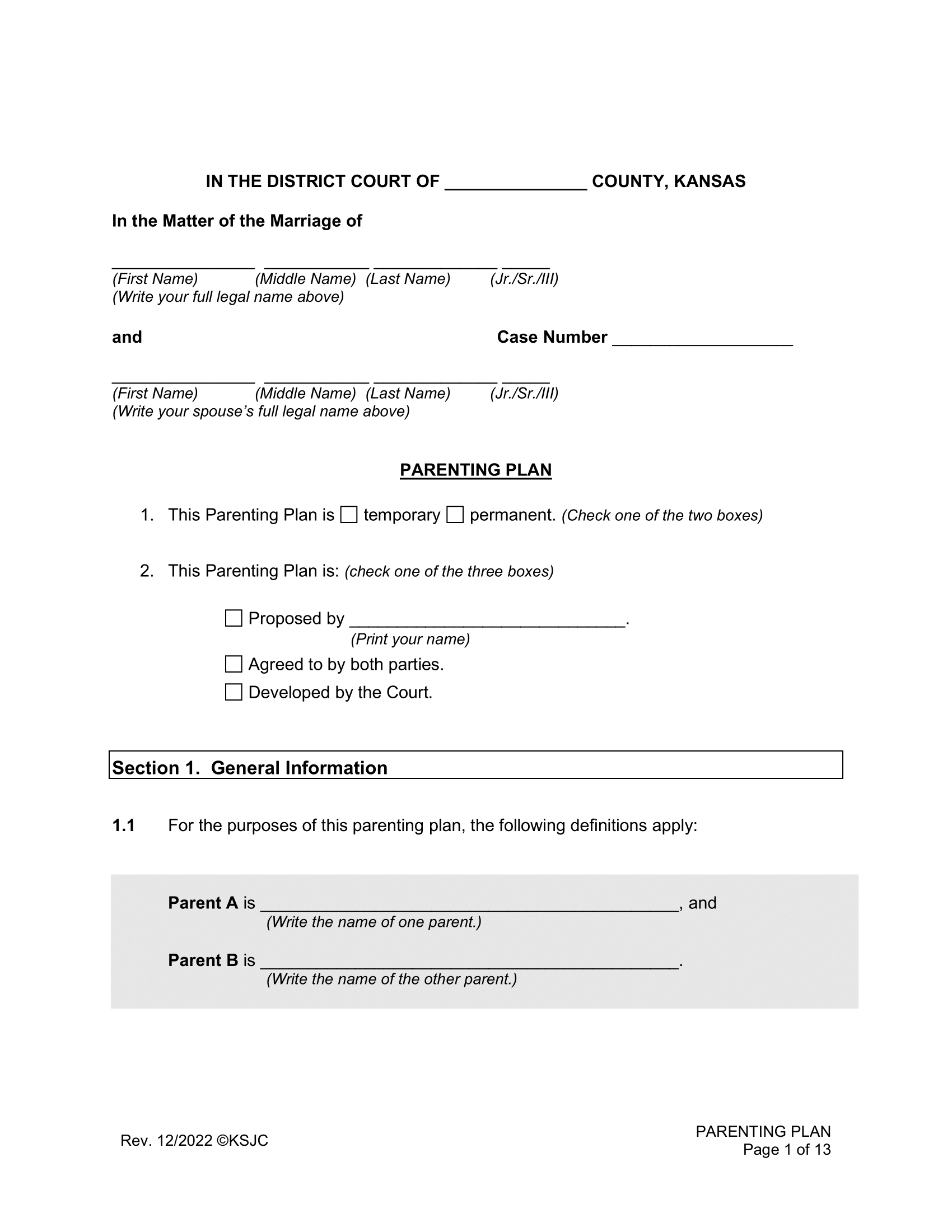It's important to recognize that in Kansas, as in many other states, the termination of parental rights is a serious legal action that cannot be accomplished through a simple written agreement between parents. Instead, it requires a formal legal process, typically initiated through a petition to the court.
This process is designed to ensure that the decision serves the best interests of the child involved (KS Stat § 23-3202). According to Kansas law, a petition to terminate parental rights can be filed either as part of an adoption proceeding or as an independent action. The petition may be filed by a parent, the petitioner for adoption, the person or agency having legal custody of the child, or the agency to which the child has been relinquished.
The court will then evaluate the petition, considering factors such as the child's best interests and the circumstances surrounding the request.
It’s also crucial to understand that voluntarily relinquishing parental rights does not automatically relieve a parent of their financial obligations, such as child support. (KS Stat § 23-3001(b)) In Kansas, a parent cannot terminate their parental rights solely to avoid paying child support. The duty to support one's child is a fundamental obligation and remains in effect unless another individual, such as a stepparent, adopts the child, thereby assuming financial responsibility.
Full Conversation

How to add relinquishment of parental rights of Parent B to Parent A in Kansas?

I understand you're looking to add the relinquishment of parental rights of Parent B to Parent A in Kansas. Have you already started the legal process for this?

No. Can this be done by having a written agreement signed?

Are both Parent A and Parent B in agreement about the relinquishment of parental rights?

Yes.

Is there anything else the Family Lawyer should know before I connect you? Rest assured they'll be able to help with parental rights relinquishment.

No, I don't think so.

Greetings! I hope this message finds you well. Thank you for choosing AskaLawyer as your legal assistance provider. My name is Angelo, and I'm an experienced and licensed attorney with over 40+ years of practice in the field of law. I'm thrilled to have the opportunity to assist you with your situation and provide you with the support you need.

Hi Angelo! Thank you so much for taking the time to speak with me. I am in the process of having a written agreement drawn up but I am unsure of the specifics regarding one area. We are in the state of Kansas.

It's important to recognize that in Kansas, as in many other states, the termination of parental rights is a serious legal action that cannot be accomplished through a simple written agreement between parents. Instead, it requires a formal legal process, typically initiated through a petition to the court.
This process is designed to ensure that the decision serves the best interests of the child involved (KS Stat § 23-3202). According to Kansas law, a petition to terminate parental rights can be filed either as part of an adoption proceeding or as an independent action. The petition may be filed by a parent, the petitioner for adoption, the person or agency having legal custody of the child, or the agency to which the child has been relinquished.
The court will then evaluate the petition, considering factors such as the child's best interests and the circumstances surrounding the request.
It’s also crucial to understand that voluntarily relinquishing parental rights does not automatically relieve a parent of their financial obligations, such as child support. (KS Stat § 23-3001(b)) In Kansas, a parent cannot terminate their parental rights solely to avoid paying child support. The duty to support one's child is a fundamental obligation and remains in effect unless another individual, such as a stepparent, adopts the child, thereby assuming financial responsibility.

My next question: In the case that the mother is able to have an attorney petition the court for the father’s relinquishment of parental rights—would they then be able to agree and establish that the mother will not pursue the father for any financial obligations past or future? Or is this something that would be a matter for the state at that point?

Regarding your follow-up, if the mother files a petition with an attorney to have the father’s parental rights relinquished in court, this is likely to involve a thorough legal process that considers the child’s best interests. As part of this process, the court will examine the implications of the termination of parental rights, including the potential financial obligations that may arise, such as child support.
As for the agreement regarding not pursuing past or future financial obligations, while the parents can reach a mutual understanding, this is not something that can be simply decided by the parents. The court in Kansas would have to ensure that such an agreement aligns with the child’s best interests.
Generally, a parent cannot waive child support obligations purely through a private agreement without court approval. The court is obligated to act in the best interests of the child, which includes ensuring that financial support is provided for the child's welfare.
In most cases, if the father's parental rights are relinquished and a stepparent is adopting the child, that new parent would assume the financial responsibility. If the father’s rights are relinquished and there is no adoption, the court would still likely maintain the child support obligation, regardless of the agreement between the parents.
So to answer your question: while you can certainly discuss these matters as part of the petition, the agreement about financial obligations would ultimately need to be approved by the court and would depend on what the court determines to be in the best interests of the child.

Are the parents able to file a signed parenting agreement with the court establishing sole custody for the mother and no visitation for the father, without an attorney?
For context as to my reasoning for these questions: The father has shown extreme cases of mental instability for the last three years, and there have been instances of physical abuse. He has remained unemployed and has not provided support of any kind in that time.
In addition, as of about 6 months ago when the mother was still allowing him time with the children, 2 out of 3 of his daughters have explained to their mother that their father has sexually molested them when she was not present. This is a very dear friend of mine, so I am inquiring to gather as much information as possible to help her through this process. Your advice is very much appreciated.

In Kansas, a signed parenting agreement can indeed be submitted to the court, but it's important to understand that even though parents can agree on matters like sole custody and no visitation, the court must approve these arrangements.
Kansas courts are bound to consider the best interests of the child when making decisions about custody, visitation, and parenting time. The court will not just rubber-stamp a signed agreement between the parents; it must be shown that the arrangement aligns with the child’s best interests.
In this particular case, with allegations of abuse and mental instability, it's critical to bring those concerns to the court’s attention. Even without an attorney, your friend can file a petition or motion to request sole custody and no visitation. However, this would typically involve some legal steps, such as submitting the proper forms, providing any relevant documentation (such as police reports, medical records, or any proof of abuse), and possibly attending hearings.

Thank you so very much for all of the advice and information. I will certainly pass along this information in hopes it is able to give her a better idea of what she will face going forward. I believe that is all that I needed to know at this time!





